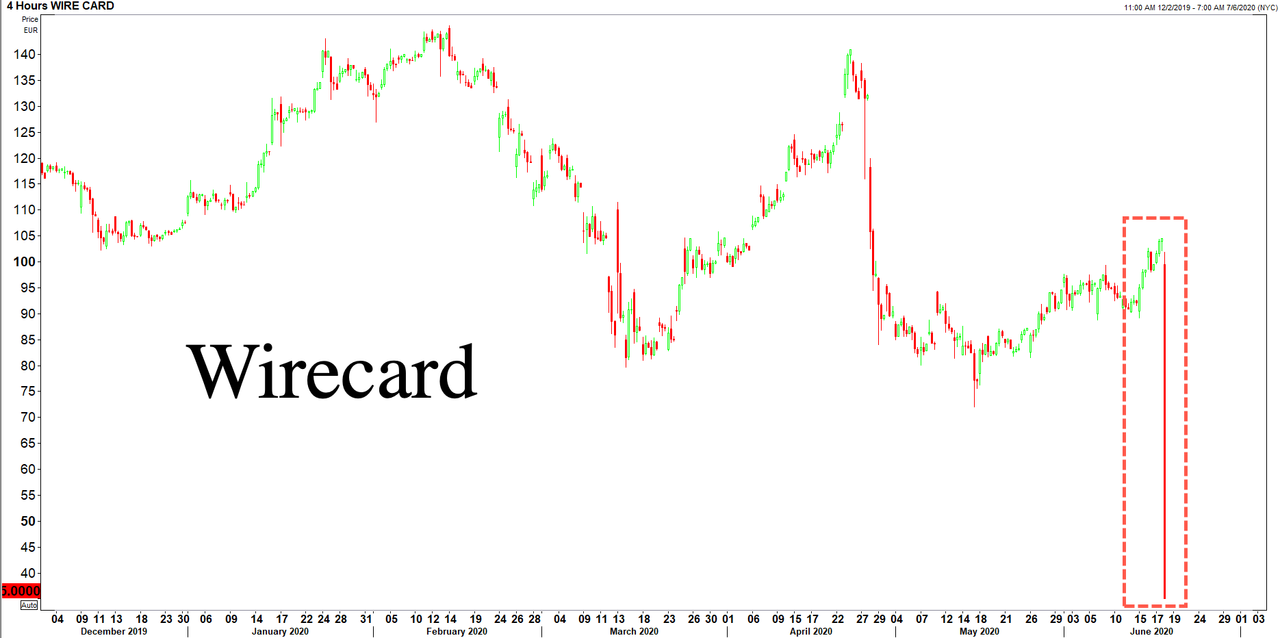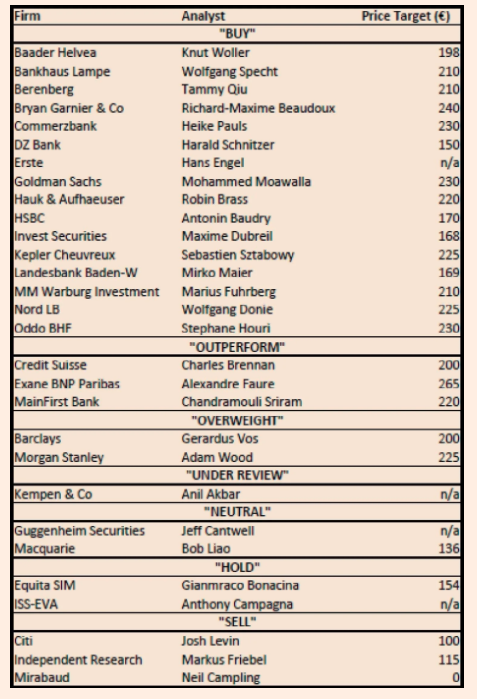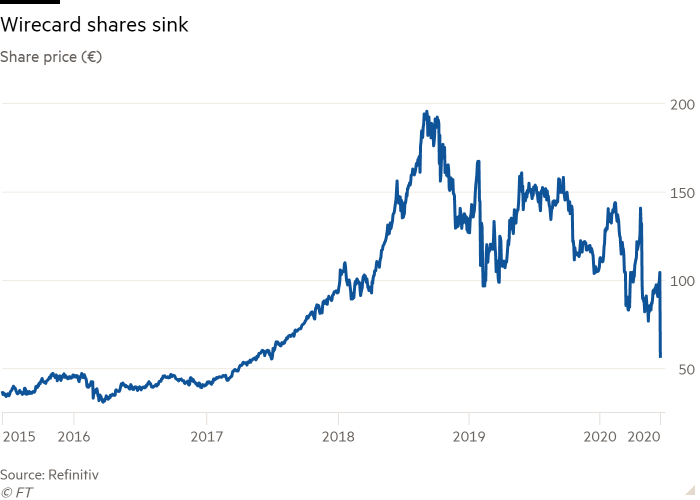gulp ... the audacity is stunning
zerohedge.com
Wirecard Shares Plunge 60% As Auditors 'Unable To Verify' $2 Billion In Cash On Its Books
Once again, it looks like the bears and the skeptics were right all along.
German payments company Wirecard delayed publication of its 2019 annual report, resulting in shares plunging by more than 50% and its bonds due in 2024 dropping 23 cents to around 58 cents on Thursday, as auditors failed to account for more than $2 billion cash balances that the company had previously reported, according to Reuters.
After having already delayed the report three times, Wirecard was set to finally release it on Thursday. However, in a not-entirely-unexpected admission, the company revealed that its auditor, Ernst & Young, was unable to verify €1.9 billion euros ($2.1 billion) in cash balances - or about a quarter of its balance sheet.
"There are indications that spurious balance confirmations had been provided" that created "a wrong perception of the existence of such cash balances or the holding of the accounts for to the benefit of Wirecard group companies," the statement read. "The Wirecard management board is working intensively together with the auditor towards a clarification of the situation."
Wirecard warned if there were no certified annual and consolidated statements by Friday, it would result in a 2 billion euro ($2.25 billion) loan being terminated.
As we've previously noted, German regulators have bent over backwards to accommodate Wirecard, even going so far as to discourage short sellers from targeting the stock, and launching an investigation into an FT reporter who published the first allegations about fraud within the fast-growing digital payments company.
Wirecard Shares Sink As Theranos-Style Whistleblower Exposes Accounting Fraud Wirecard Sues The Financial Times Over "Slanderous, Unproven & False" Reporting Wirecard Shares Soar After Internal Probe Clears Company Of Fraud Allegations Wirecard Soars As Soft Bank Crushes Shorts After Buying 5.6% StakeWirecard shares fell 60% on Thursday, erasing nearly 2/3rds of their value.

Unsurprisingly, the FT journalist who faced a vicious attack on his credibility by both the company and German financial regulator BaFin is having the last laugh on twitter after the company, its army of goons, the German government and even some sell-side analysts attacked his reporting.
Now, those same sell-side analysts who questioned the FT probably have some explaining to do...

...as it appears the FT reporting has been largely vindicated.
ft.com
Wirecard says €1.9bn of cash is missingShares of payments group crash as it says a third-party may have tried ‘to deceive’ its auditor
2 hours ago
Wirecard said it was ‘working intensively’ to clarify the situation © REUTERSShares in Wirecard crashed on Thursday after the German payments group said €1.9bn of cash was missing and that “spurious cash balances” might have been provided to its auditor by a third party.
The once high-flying company was told by EY that there were indications a trustee of Wirecard bank accounts had attempted “to deceive the auditor”, deepening the crisis at a group long seen as a great hope for Germany’s tech sector.
Wirecard’s market value, which had soared to more than €24bn when it joined Germany’s prestigious Dax 30 index two years ago, collapsed to less than €7bn on Thursday as its shares plunged more than 50 per cent.
In a statement, Wirecard, which owns a Munich bank, said it was “working intensively together with the auditor towards a clarification of the situation”. It noted that conditions attached to its borrowing meant that if financial statements for 2019 were not published by Friday June 19 then €2bn of loans to the company “can be terminated”.
The result leaves in doubt the future of a company responsible for processing tens of billions of euros of credit and debit card transactions each year as a member of the Visa and Mastercard networks.

Markus Braun, the company’s chief executive and largest shareholder, had masterminded Wirecard’s expansion from a Munich suburb into a business processing payments across the world.
The revelation on Thursday caps a tumultuous period for Wirecard, which last year had commissioned a special audit by KPMG in an effort to allay concerns over its accounting.
The Financial Times reported in October that Wirecard staff appeared to have conspired to fraudulently inflate sales and profits at Wirecard subsidiaries in Dubai and Dublin and mislead EY, the group’s auditor for a decade.
In December, the FT reported that so-called escrow accounts, controlled on the behalf of Wirecard and certain partners by trustees, were used to boost the group’s cash balances.
Markus Braun, chief executive of Wirecard © EPA-EFEWirecard postponed the publication of its 2019 results three times since March, but since then told investors repeatedly that it “expects an unqualified audit opinion”.
The six-month special audit by KPMG was unable to resolve questions about the group’s accounting. Forensic examiners could not trace transactions underpinning “the lion's share” of Wirecard profits reported between 2016 and 2018, according to the results of the audit published in late April.
Cash generated by the suspect business was directed largely into escrow accounts managed on behalf of Wirecard and its partners by a trustee. KPMG said it could not independently confirm the existence of €1bn of cash in such accounts, and that the trustee cut ties to Wirecard at around the time the special audit began.
Wirecard now faces multiple investigations into its accounting, its disclosures to investors and trading by its chief executive in shares of the company. The US Department of Justice is also investigating a hacker-for-hire group which targeted thousands of individuals globally, in which one cluster of victims included journalists, hedge funds and researchers critical of Wirecard.
Wirecard has always denied any wrongdoing. It spent the past 18 months downplaying questions over its accounting, since the FT reported whistleblower allegations that staff in the group’s Asian headquarters in Singapore had forged documents to deceive regulators and auditors.
After Wirecard’s Singapore offices were raided by police last year, the German financial regulator, BaFin, announced a two-month short selling ban in Wirecard stock to protect the company from speculators.
Wirecard had €1.8bn of debt outstanding at the end of September, at which time the Munich bank it controls held €1.7bn of customer deposits. A €500m bond issued by the company that month was quoted at about 50 cents on the euro on Thursday, according to multiple traders. |







